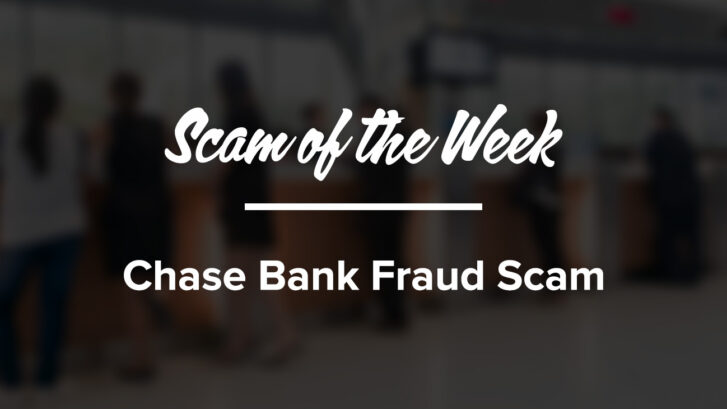Identity theft is alive and well. With inflation continuing to rise and prices getting higher, scammers are constantly looking for an edge. The Chase Bank Fraud scam uses “spoofing” tactics to make a phone call and disguise identity by using technology to make it appear as if the call is coming from a legitimate source. It’s important to protect yourself from the potential harmful intentions of these fraudsters, who are ultimately looking to steal private information.
In this article, we cover:
- The details of the Chase Bank Fraud Scam Scam
- Why the Chase Bank Fraud Scam Scam is dangerous
- How to protect yourself from the Chase Bank Fraud Scam
The details of the Chase Bank Fraud Scam
The Chase Bank Fraud Scam is set up to take users’ personal information. The scam impersonates a security message from Chase Bank and informs the user that there has been fraudulent activity on their debit card account. The user is prompted to press a number to speak to a Chase Bank representative. With a fraud score of 80, the Chase Bank Fraud Scam’s most called locations are Florida, Virginia, Georgia, Texas, and California. The most used numbers are 1-202-833-7500, 1-800-777-9898, 1-502-589-1444, 1-800-968-8243, and 1-305-447-2698.
Actual audio of a bank card scam exploiting the Chase Bank brand
“This is a message from Chase bank. We regret to inform you that your debit card has been locked. To reactivate it, please press one now and you will be transferred to our security department.”
Why the Chase Bank Fraud Scam is dangerous
This type of scam, commonly known as “spoofing,” involves a fraudster making a phone call and disguising their identity by using technology to make it appear as if the call is coming from a legitimate Chase phone number or local number. The fraudster may then claim to be a representative from Chase and ask the victim for personal information, such as their account number, Social Security number, or other sensitive data.
Spoofing has become increasingly prevalent in recent years and is a major concern for financial institutions like Chase. It’s important for consumers to be aware of this type of scam and to never provide personal information over the phone unless they are certain of the caller’s identity.

How to protect yourself from the Chase Bank Fraud Scam
It’s important to note that Chase Bank, like many other legitimate financial institutions, will never ask for personal information over the phone or via email. If you receive a call that you suspect is fraudulent, do not provide any personal information and hang up immediately. To protect yourself, you can verify the caller’s identity by hanging up and calling back on a known, trusted phone number for Chase. You can also enable call blocking and screening features on your phones or use a call blocking app like YouMail to reduce the number of unwanted calls you receive. By taking these precautions, you can reduce your risk of falling victim to spoofing scams.
Find about more Robocall Scams at the YouMail Robocall Scam Guide.
To protect yourself from the Chase Bank Fraud Scam, download YouMail today.





